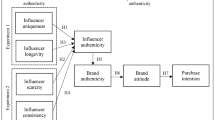Abstract
The need for conceptual work in marketing ethics is addressed by examining the five techniques of neutralization as a means for partially explaining “unethical” behaviors by marketing practitioners. These techniques are often used by individuals to lessen the possible impact of norm-violating behaviors upon their self-concept and their social relationships. Borrowed from the social disorganization and deviance literature, the five techniques of neutralization are: (1) denial of responsibility, (2) denial of injury, (3) denial of victim, (4) condemning the condemners and (5) appeal to higher loyalties. Examples of marketing professionals using each of the five techniques are given, and a conceptual model linking the techniques of neutralization with “unethical” behavior is presented. Finally, relevant research questions are offered for consideration.
Similar content being viewed by others
References
Akers, Ronald: 1977, Deviant Behavior: A Social Learning Approach, Wadsworth, Belmont, California.
Brenner, Steven N. and Earl A. Molander: 1977, ‘Is the Ethics of Business Executives Changing?’, Harvard Business Review (January–February), pp. 57–71.
Clinard, Marshall B.: 1983, Corporate Ethics and Crime, Sage Publications, Beverly Hills, California.
Drucker, Peter F.: 1981, ‘What is Business Ethics?’ Across the Board (October), pp. 22–32.
Ferrell, O. C. and Larry G. Gresham: 1985, ‘A Contingency Framework for Understanding Ethical Decision Making in Marketing,’ Journal of Marketing 49, pp. 87–96.
Hegarty, W. Harvey and Henry P. Sims: 1978, ‘Some Determinants of Unethical Behavior: An Experiment,’ Journal of Applied Psychology 4, pp. 451–457.
Hegarty, W. Harvey and Henry P. Sims: 1979, ‘Organizational Philosophy, Policies, and Objectives Related to Unethical Decision Behavior: A Laboratory Experiment,’ Journal of Applied Psychology 3, pp. 331–338.
Matza, David and Gresham M. Sykes: 1961, ‘Delinquency and Subterranean Values,’ American Sociological Review 26, (October), pp. 712–719.
Mayer, R. R.: 1970, ‘Management's Responsibility for Purchasing Ethics,’ Journal of Purchasing 4, pp. 13–20.
Murphy, Patrick E. and Gene R. Laczniak: 1981, ‘Marketing Ethics: A Review with Implications for Managers, Educators and Researchers,’ Review of Marketing 1981, Ben M. Enis and Kenneth J. Roering (eds.), pp. 251–266.
Snyder, James D.: 1976, ‘Bribery in Selling: The Scandal Comes Home,’ Sales and Marketing Management (May 10), pp. 35–38.
Sonnefeld, Jeffrey and Paul R. Lawrence: 1978, ‘Why do Companies Succumb to Price Fixing?’ Harvard Business Review (July–August), pp. 145–157.
Sykes, Gresham M. and David Matza: 1957, ‘Techniques of Neutralization: A Theory of Delinquency,’ American Sociological Review 22 (December), pp. 664–670.
Weaver, K. Mark and O. C. Ferrell: 1977, ‘The Impact of Corporate Policy on Reported Ethical Beliefs and Behavior of Marketing Practitioners,’ American Marketing Association Proceedings, pp. 477–481.
Zey-Ferrell, Mary, K. Mark Weaver and O. C. Ferrell: 1979, ‘Predicting Unethical Behavior Among Marketing Practitioners,’ Human Relations 7, pp. 557–569.
Author information
Authors and Affiliations
Additional information
Scott J. Vitell is Assistant Professor of Marketing at The University of Mississippi. His most important publications include ‘A General Theory of Marketing Ethics’ (1986) (with Shelby D. Hunt) and ‘Marketing's Contribution to Economic Development: A Look at the Last 30 Years’ (1985) (with Van R. Wood).
Stephen J. Grove is Assistant Professor of Marketing at Clemson University. His articles have appeared in the Journal of Health Care Marketing, the International Journal of Sport Psychology, the Journal of Sport Behavior, the Bulletin of the Association for Business Communication, Simulation and Games, and several national and regional conference proceedings.
Rights and permissions
About this article
Cite this article
Vitell, S.J., Grove, S.J. Marketing ethics and the techniques of neutralization. J Bus Ethics 6, 433–438 (1987). https://doi.org/10.1007/BF00383285
Issue Date:
DOI: https://doi.org/10.1007/BF00383285




